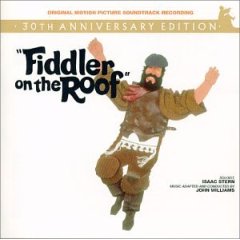It just doesn’t get any better than this – sitting at my computer, sharing with you all the reasons I love certain movies, and getting to relive each magical moment in my mind. “Fiddler on the Roof” caught my heart from the opening credits and has held me tight ever since.
A little background on me – I have always been fascinated with Russia and was able to go there as a teenager. “Fiddler” takes place in a pre-Revolutionary Russian Jewish village called Annatefka, a poor, isolated village where the people depend on each other for their welfare. One such man is Tevye, a poverty stricken milk farmer who has been blessed with five daughters and no sons. He wonders how he will ever prosper in this life with no sons. His only real chance is for his daughters to marry well.
His oldest daughter, Tzietel, has caught the eye of the butcher. That would be a good match. The butcher is wealthy, she would always have enough to eat. But Tsietel is in love with Motel, a tailor so poor he can’t rub two threads together. When she begs Tevye to let them marry, he gives in, but then he has to figure out a way to break the news to his wife. Concocting a wild dream, he uses her superstitions against her and the two lovebirds are able to get married.
His second daughter, Hodel, falls in love with a young man named Perchik who is a religious reformer. He’s Jewish, but he’s forward thinking and wants to move Judaism into the future. Tevye isn’t so sure of this new way of thinking, but when Hodel tells her father how much she loves Perchik, he lets her go.
Tevye doesn’t know how to handle all this upheaval in his life. Everything must be guided by tradition. There is a tradition for everything they do, and if they stray from it, they will be as shaky as a fiddler on a roof. Tzietel and Hodel have both gone against tradition a little bit, but he can’t sway any further or it will tell him apart.
Chava, his third daughter, loves to read. While walking along the road one day, she is accosted by some Gentiles who give her a hard time, and is rescued by another Gentile named Fyedka. She shouldn’t speak to him, and she knows she shouldn’t, but she sees that he is holding a book and she can’t help herself. Before long, they are meeting secretly, and she has fallen in love with him.
Tevye cannot accept this. It’s one thing to break an engagement, one thing to marry a revisionist, but it’s quite another to turn your back on your religion and marry a Gentile. He absolutely refuses to give his blessing, and so Chava and Fyedka marry in the Catholic church and become dead to Tevye’s family.
Meanwhile, things are very shaky on the political front and soon all Jews must leave the village. This scene provides one of the most heart-wrenching sights of the movie; all the people packing up and pushing wagons full of their things through the snow. Many of them will travel to America to be with family members who have already immigrated, but some don’t have anywhere to go.
This movie brings us closer to the touching plight of the Russian Jew, to the terrain of the land, and the values and traditions held so dear. It also brings us some of the best music we’ve ever had come off the Broadway stage: “Matchmaker, Matchmaker,”
“Tradition,” “If I Were a Rich Man,” to name only a few. There are somber moments and one scene of mild violence, but all in all, I think your family will enjoy this, both for its educational value and for entertainment. It is truly a modern classic.

Related Blogs:
Shelter Pup Wins Starring Role on Broadway

